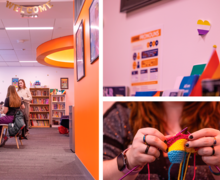How students from Falk College will fight child obesity
Courtesy of SU Photo & Imaging Center
Between eight and 10 students from Falk College will participate in a UNICEF program to fight childhood obesity.
A group of students from Syracuse University’s Falk College will assist a month-long UNICEF-sponsored program taking place at two Syracuse elementary schools, making the college the first in the United States to be involved with the program at the college-level.
Between eight and 10 selected students from the David B. Falk College of Sport and Human Dynamics will interact with 200 students from McKinley-Brighton Elementary School and LeMoyne Elementary School in Syracuse as part of the Kid Power program this semester.
The program, announced by the U.S. Fund for UNICEF in February 2015, is designed to tackle the child obesity issue in the U.S. and child malnourishment in developing countries.
Kid Power entails students wearing UNICEF Kid Power fitness bands, which show the number of steps taken. For every 12,000 steps a student takes, one packet of a protein and vitamin-rich peanut paste will be dispensed to children in developing countries, according to a UNICEF press release.
“This is good for our students. It is good for the Syracuse community. It is good for children in need,” said Teresa MacDonald, instructor and director of the Sport for Human Development Institute in the Falk College.
MacDonald added that SU is the only university involved in the Kid Power program.
MacDonald said the institute was looking at different projects to get students some experience with UNICEF’s work on humanitarian aid.
“I think it’s important for our students to have an opportunity to participate in a program where they are also being exposed to nonprofits — philanthropic work,” MacDonald said.
Elementary school students taking a part in the program will wear the bands between Feb. 25 and March 26, MacDonald said.
Jessa Salibrici, literacy coach at McKinley-Brighton Elementary School, said the project fits in line with the core beliefs of the elementary school on promoting a sense of community.
“Because if they walk 12,000 steps, a box of food is donated to developing countries, and there is the other side of it that will happen on a classroom around, you know, ‘Where are these supplies going, and what are the needs of these kids around the world that are kids just like kids at McKinley, and how can we make a difference?’” Salibrici said.
Salibrici said the school is trying to determine whether students should wear the bands only during school hours or outside of the school as well.
Salibrici added that she thinks the school will send permission slips to the parents of those students who will be participating in the program.
MacDonald said teachers are given tablets to monitor the progress of their students. That information will be shared with her and UNICEF.
The students involved will learn about humanitarian aid and the work of UNICEF through online meetings. The students will also work with MacDonald to advertise the program and collect the data in exchange for credit, MacDonald said.
MacDonald said she learned about the project about a year ago during discussions about a partnership between the Sport for Human Development Institute and UNICEF.
MacDonald added that the program is funded by a portion of donations given to the institute.
The Kid Power program had a four-week pilot program in October 2014 in Sacramento, California, in which nearly 900 students, teachers and teaching assistants at six different schools joined the program, according to the UNICEF press release.
The elementary school students who were involved with the program were 55 percent more active than those who were not and contributed to the distribution of food packets to about 473 severely malnourished children, according to the press release.
The program will also take place in 10 other U.S. cities besides Syracuse, MacDonald said.
Published on January 27, 2016 at 11:18 pm
Contact Satoshi: ssugiyam@syr.edu | @SatoshiJournal





